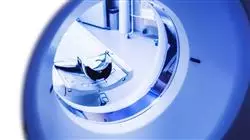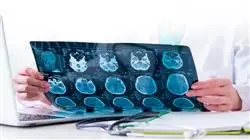University certificate
Scientific endorser

The world's largest faculty of nursing”
Introduction to the Program
Thanks to this 12-month Professional master’s degree with the most current syllabus on Radiological Nursing”

Technological evolution has brought with it important achievements in Radiology and with it in the detection of diseases through much more precise images. All this, in addition to much more effective and safer procedures for both the patient and the nursing professional, in charge of administering drugs or facilitating the performance of tests.
In this sense, the role of healthcare professionals is essential, so it is necessary that they are aware of the latest advances in imaging techniques, in the protocols of action, thus improving the coloration with the medical professional in making appropriate decisions. Faced with this reality, TECH has designed this 100% online university program that takes students over 12 months to make a complete update in Radiological Nursing.
A Professional master’s degree that is distinguished by having an advanced agenda ranging from care management and organization of the Area of Diagnostic Imaging and Treatment, the DTI Service, to the most notorious advances in Computed Tomography, Magnetic Resonance Imaging or Radiation Oncology, among others.
All this, in addition, with first class teaching material based on video summaries of each topic, videos in detail, specialized readings and clinical case studies, which make up a vast library of resources to which the graduate will have access 24 hours a day, from any digital device with Internet connection.
In addition, this updating process will be much simpler and more effective thanks to the Relearning method, based on the continuous reiteration of key concepts throughout the academic itinerary. In this way, the graduates will be able to reduce the long hours of study and consolidate the most important concepts covered in this program.
Undoubtedly, a university proposal that responds to the real needs of updating nursing professionals through a flexible and convenient qualification. And the fact is that, with no classroom attendance or classes with fixed schedules, the graduates have greater freedom to self-manage their study time and reconcile it with their daily personal activities.
You will be aware of the procedures performed in the Breast and Brachytherapy Unit from patients in consultation to those referred to the operating room after the placement of a harpoon”
This Professional master’s degree in Radiological Nursing contains the most complete and up-to-date scientific program on the market. The most important features include:
- The development of case studies presented by experts in Nursing in the area of Diagnostic and Imaging Treatment
- Graphic, schematic, and practical contents with which they are created, provide scientific and practical information on the disciplines that are essential for professional practice
- Practical exercises where self-assessment can be used to improve learning
- Its special emphasis on innovative methodologies
- Theoretical lessons, questions to the expert, debate forums on controversial topics, and individual reflection assignments
- Content that is accessible from any fixed or portable device with an Internet connection
You are looking at a university program that fits your schedule and your motivation to update your skills in Radiological Nursing”
The program’s teaching staff includes professionals from sector who contribute their work experience to this educational program, as well as renowned specialists from leading societies and prestigious universities.
Its multimedia content, developed with the latest educational technology, will provide the professionals with situated and contextual learning, i.e., a simulated environment that will provide an immersive education programmed to learn in real situations.
The design of this program focuses on Problem-Based Learning, by means of which the professionals must try to solve the different professional practice situations that are presented throughout the academic course. For this purpose, the students will be assisted by an innovative interactive video system created by renowned experts.
Get a complete update on the administration of radiopharmaceuticals and the techniques used to administer them depending on the study procedure"

Delve whenever and wherever you want into complex contrast screening, adverse reactions to contrast administration, allergies and imaging test management"
Why study at TECH?
TECH is the world’s largest online university. With an impressive catalog of more than 14,000 university programs available in 11 languages, it is positioned as a leader in employability, with a 99% job placement rate. In addition, it relies on an enormous faculty of more than 6,000 professors of the highest international renown.

Study at the world's largest online university and guarantee your professional success. The future starts at TECH”
The world’s best online university according to FORBES
The prestigious Forbes magazine, specialized in business and finance, has highlighted TECH as “the world's best online university” This is what they have recently stated in an article in their digital edition in which they echo the success story of this institution, “thanks to the academic offer it provides, the selection of its teaching staff, and an innovative learning method aimed at educating the professionals of the future”
A revolutionary study method, a cutting-edge faculty and a practical focus: the key to TECH's success.
The most complete study plans on the university scene
TECH offers the most complete study plans on the university scene, with syllabuses that cover fundamental concepts and, at the same time, the main scientific advances in their specific scientific areas. In addition, these programs are continuously being updated to guarantee students the academic vanguard and the most in-demand professional skills. In this way, the university's qualifications provide its graduates with a significant advantage to propel their careers to success.
TECH offers the most comprehensive and intensive study plans on the current university scene.
A world-class teaching staff
TECH's teaching staff is made up of more than 6,000 professors with the highest international recognition. Professors, researchers and top executives of multinational companies, including Isaiah Covington, performance coach of the Boston Celtics; Magda Romanska, principal investigator at Harvard MetaLAB; Ignacio Wistumba, chairman of the department of translational molecular pathology at MD Anderson Cancer Center; and D.W. Pine, creative director of TIME magazine, among others.
Internationally renowned experts, specialized in different branches of Health, Technology, Communication and Business, form part of the TECH faculty.
A unique learning method
TECH is the first university to use Relearning in all its programs. It is the best online learning methodology, accredited with international teaching quality certifications, provided by prestigious educational agencies. In addition, this disruptive educational model is complemented with the “Case Method”, thereby setting up a unique online teaching strategy. Innovative teaching resources are also implemented, including detailed videos, infographics and interactive summaries.
TECH combines Relearning and the Case Method in all its university programs to guarantee excellent theoretical and practical learning, studying whenever and wherever you want.
The world's largest online university
TECH is the world’s largest online university. We are the largest educational institution, with the best and widest online educational catalog, one hundred percent online and covering the vast majority of areas of knowledge. We offer a large selection of our own degrees and accredited online undergraduate and postgraduate degrees. In total, more than 14,000 university degrees, in eleven different languages, make us the largest educational largest in the world.
TECH has the world's most extensive catalog of academic and official programs, available in more than 11 languages.
Google Premier Partner
The American technology giant has awarded TECH the Google Google Premier Partner badge. This award, which is only available to 3% of the world's companies, highlights the efficient, flexible and tailored experience that this university provides to students. The recognition as a Google Premier Partner not only accredits the maximum rigor, performance and investment in TECH's digital infrastructures, but also places this university as one of the world's leading technology companies.
Google has positioned TECH in the top 3% of the world's most important technology companies by awarding it its Google Premier Partner badge.
The official online university of the NBA
TECH is the official online university of the NBA. Thanks to our agreement with the biggest league in basketball, we offer our students exclusive university programs, as well as a wide variety of educational resources focused on the business of the league and other areas of the sports industry. Each program is made up of a uniquely designed syllabus and features exceptional guest hosts: professionals with a distinguished sports background who will offer their expertise on the most relevant topics.
TECH has been selected by the NBA, the world's top basketball league, as its official online university.
The top-rated university by its students
Students have positioned TECH as the world's top-rated university on the main review websites, with a highest rating of 4.9 out of 5, obtained from more than 1,000 reviews. These results consolidate TECH as the benchmark university institution at an international level, reflecting the excellence and positive impact of its educational model.” reflecting the excellence and positive impact of its educational model.”
TECH is the world’s top-rated university by its students.
Leaders in employability
TECH has managed to become the leading university in employability. 99% of its students obtain jobs in the academic field they have studied, within one year of completing any of the university's programs. A similar number achieve immediate career enhancement. All this thanks to a study methodology that bases its effectiveness on the acquisition of practical skills, which are absolutely necessary for professional development.
99% of TECH graduates find a job within a year of completing their studies.
Professional Master's Degree in Radiological Nursing
If you are a nurse looking to enhance your skills and knowledge in the radiology service, a Professional Master's Degree in Radiologic Nursing is a great option for you. This graduate program is designed to provide you with specialized, advanced academic instruction in patient care in the radiologic setting, including diagnostic and therapeutic procedures, and in a fully online format. During the Professional Master's Degree in Radiologic Nursing, you will acquire specialized knowledge in the use of advanced technology in the diagnosis and treatment of disease, as well as skills in working as a team with other healthcare professionals to ensure patient safety. In addition, you will learn how to interpret and communicate the results of radiological studies to patients and their families clearly and effectively.
Specialize in radiology for nurses
One of the advantages of studying for a Professional Master's Degree in Radiology Nursing is that you will be able to specialize in a highly sought-after area within the nursing field. Radiology services are essential for the diagnosis and treatment of a wide variety of diseases, which means that nurses with specialized skills in this area are in high demand. In addition, a Professional Master's Degree in Radiologic Nursing can provide you with many career opportunities in different healthcare settings, such as hospitals, clinics, imaging centers, and physician offices. In short, if you are a nurse looking to improve your skills and knowledge in the radiology service, a Professional Master's Degree in Radiologic Nursing may be an excellent choice for you. With this specialized training, you will be able to acquire the skills and knowledge necessary to provide exceptional patient care in a radiological setting, allowing you to excel in your career and have more job opportunities. Don't hesitate to consider this educational option to advance your career as a nurse!







